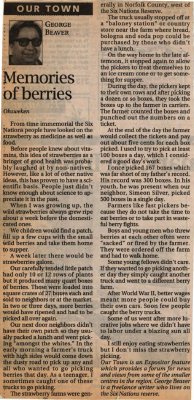"Memories of berries"
- Full Text
- OUR TOWNMemories of berriesGeorge Beaver, Ohsweken
From time immemorial the Six Nations people have looked on the strawberry as medicine as well as food.
Before people knew about vitamins, this idea of strawberries as a bringer of good health was probably laughed at by non-natives. However, like a lot of other native ideas, this has proven to have a scientific basis. People just didn't know enough about science to appreciate it in the past.
When I was growing up, the wild strawberries always grew ripe about a week before the domesticated ones.
We children would find a patch, fill up a few cups with the small wild berries and take them home to supper.
A week later there would be strawberries galore.
Our carefully tended little patch had only 10 or 12 rows of plants but it produced many quart boxes of berries. These were loaded into square crates of 27 boxes each and sold to neighbors or at the market. In two or three days, more berries would have ripened and had to be picked all over again.
Our next door neighbors didn't have their own patch so they usually packed a lunch and went picking "amongst the whites." In the early morning a farmer's truck with high sides would come down the dusty road to pick up any and all who wanted to go picking berries that day. As a teenager, I sometimes caught one of these trucks to go picking.
The strawberry farms were generally in Norfolk County, west of the Six Nations Reserve.
The truck usually stopped off at a "baloney station" or country store near the farm where bread, bologna and soda pop could be purchased by those who didn't have a lunch.
On the way home in the late afternoon, it stopped again to allow the pickers to treat themselves to an ice cream cone or to get something for supper.
During the day, the pickers kept to their own rows and after picking a dozen or so boxes, they took the boxes up to the farmer in carriers. The farmer counted the boxes and punched out the numbers on a ticket.
At the end of the day the farmer would collect the tickets and pay out about five cents for each box picked. I used to try to pick at least 100 boxes a day, which I considered a good day's work.
I once picked 167 boxes which was far short of my father's record. His record was 300 boxes. In his youth, he was present when our neighbor, Simeon Silver, picked 500 boxes in a single day.
Farmers like fast pickers because they do not take the time to eat berries or to take part in wasteful berry fights.
Boys and young men who threw berries at each other often were "sacked" or fired by the farmer. They were ordered off the farm and had to walk home.
Some young fellows didn't care. If they wanted to go picking another day they simply caught another truck and went to a different berry farm.
After World War II, better wages meant more people could buy their own cars. Soon few people caught the berry trucks.
Some of us went after more lucrative jobs where we didn't have to labor under a blazing sun all day.
I still enjoy eating strawberries but I don't miss the strawberry picking.
Our Town is an Expositor feature which provides a forum for news and views from some of the smaller centres in the region. George Beaver is a freelance writer who lives on the Six Nations reserve.
- Creator
- Beaver, George, Author
- Media Type
- Text
- Newspaper
- Item Type
- Clippings
- Publisher
- Brantford Expositor
- Place of Publication
- Brantford, ON
- Subject(s)
- Personal Name(s)
- Silver, Simeon.
- Local identifier
- SNPL003220v00d
- Collection
- Scrapbook #6
- Language of Item
- English
- Geographic Coverage
-
-
Ontario, Canada
Latitude: 43.06681 Longitude: -80.11635
-
- Creative Commons licence
 [more details]
[more details]- Copyright Statement
- Public domain: Copyright has expired according to Canadian law. No restrictions on use.
- Copyright Holder
- Brantford Expositor
- Contact
- Six Nations Public LibraryEmail:info@snpl.ca
Website:
Agency street/mail address:1679 Chiefswood Rd
PO Box 149
Ohsweken, ON N0A 1M0
519-445-2954




